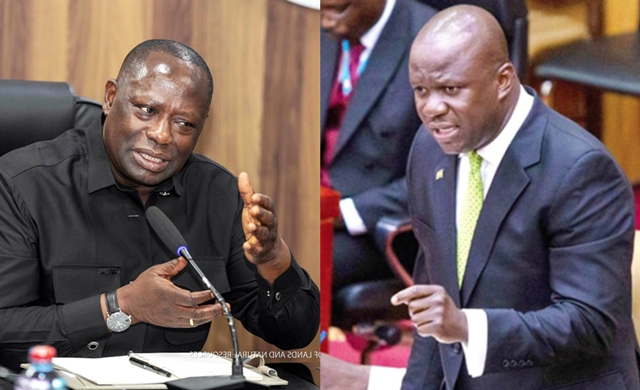Ghana’s new Ewoyaa Lithium Mining Lease Agreement between the Government of Ghana and Barari DV Ghana Limited sparked intense exchanges on the floor of Parliament on Tuesday, as the Minister for Lands and Natural Resources and Acting Minister for Science and Environment, Emmanuel Armah-Kofi Buah, laid the revised deal for ratification in accordance with Article 268 of the 1992 Constitution.
The presentation was met with strong objections from the Member of Parliament for Damongo and former Lands Minister, Samuel Abu Jinapor, who questioned the rationale behind bringing back what he described as a repackaged version of a deal Parliament had previously rejected during the 8th Parliament.
Laying the agreement before the House, Mr. Buah explained that the new Ewoyaa lease was necessary to reflect current market realities, particularly the sharp fall in global lithium prices.
Also read: Atlantic Lifesciences urges gov’t to Review L.I. 2255 to support local drug and vaccine production
“The lease was presented in the eighth Parliament for ratification, but it was not approved before the House adjourned. Since then, the basis of the agreement—especially the price of lithium—has changed. At the time of negotiation, lithium was around $3,000 per tonne, but the current price is about $630, putting the project at risk of collapse.”
The Minister said the company, Barari DV Ghana Limited, had appealed to the government to review specific provisions of the previous agreement to ensure the project remained economically viable.
The three key areas reviewed include the royalty rate, the VAT treatment on capital inputs, and the feasibility of the trans-shipment facility. These updates have been incorporated into the new lease, which has been approved by Cabinet and is before Parliament for ratification.
He emphasized that the government’s decisions are guided by national interest, not politics, adding that the adjustment is a prudent move to keep the project alive while protecting local communities whose livelihoods have already been affected by land acquisition.
What has changed?
Former Minister for Lands and Natural Resources, Samuel Abu Jinapor, however, challenged the decision to lay the agreement, arguing that the revised deal is no different from the version his government had presented in 2023 under former President Nana Addo Dankwa Akufo-Addo.
“Mr. Speaker, I was in this House in the 8th Parliament when a similar explanatory statement was made for the same agreement between the Government of Ghana and Barari DV Ghana Limited. The terms are not different. What has changed? What has changed between that agreement and the one before us today?” he questioned.
The former Lands Minister maintained that the Speaker’s decision in the 8th Parliament to reject the earlier version was in the national interest, insisting that the same reasoning should apply today.
“Lithium is not just another mineral; it is the foundation of the global green energy revolution. When the Speaker insisted that Ghana must get full benefit from its exploitation, that was for the good of the country. Nothing has changed to justify a reversal of that position,” he said.
Mr. Jinapor criticized the new agreement as a weaker and less beneficial deal than the one negotiated under the previous administration.
“One would have expected that the agreement the Minister is laying would be an improvement upon what the Akufo-Addo administration brought. But on the face of it, this new agreement is worse. The royalty rate has been lowered, and the overall benefits to Ghana are less than before,” he argued.
He recalled that under the earlier deal, the government had secured some of the best fiscal terms in the mining industry, including a 13% carried interest, 10% royalty, and provisions for listing 30% of the company’s shares on the Ghana Stock Exchange to allow Ghanaian participation.
“We had ensured that the Ghana Investment Promotion Centre (GIPC), the Minerals Income Investment Fund (MIIF), and local communities would all have a share. Now, all of that is being eroded under the guise of market adjustment,” he stated.
Mr. Jinapor urged the Speaker and Parliament to reject the new lease, emphasizing that Ghana’s mineral resources belong to the people, not the government.
“If the new agreement had better terms and is truly in Ghana’s interest, we would have no hesitation in supporting it. But this deal is a step backwards,” he stressed.
Speaker of Parliament Alban Sumana Kingsford Bagbin clarified on the procedural history of the Ewoyaa lease. He confirmed that the previous Parliament did not reject the agreement, explaining that it was referred to the appropriate committee but was never brought back for plenary consideration before the term ended.
He assured Members that the Committee on Lands and Forestry will carefully review the new lease before a final decision is taken.
“I am passionate about mineral agreements and will be very critical in my guidance. But at the end of the day, the decision lies with the House. Let’s ensure national interest prevails, not party interest,” Bagbin said.
Background
The Ewoyaa Lithium Project, located in Ghana’s Central Region, is being developed by Barari DV Ghana Limited, a subsidiary of Atlantic Lithium Limited. The project is seen as Ghana’s first major attempt to commercialize lithium, a critical mineral essential for electric vehicle batteries and the global clean energy transition.
However, the deal has remained controversial, with civil society groups and mining experts demanding greater transparency, value addition, and local participation before ratification.
The deal has now been referred to the Parliamentary Committee on Lands and Forestry for consideration and report.


